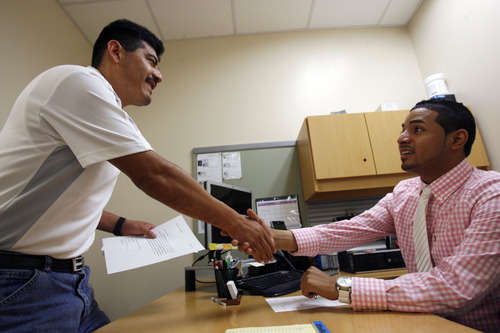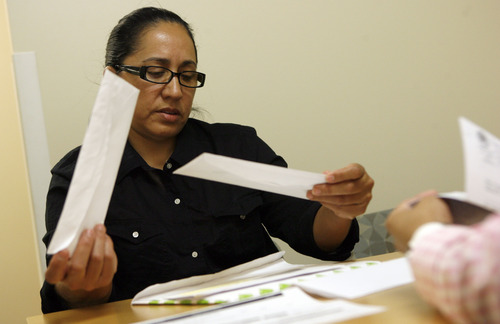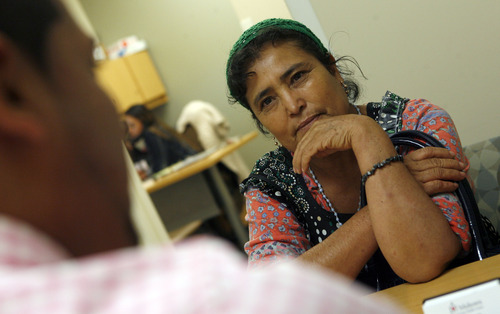This is an archived article that was published on sltrib.com in 2013, and information in the article may be outdated. It is provided only for personal research purposes and may not be reprinted.
If you're uninsured in Utah, who will tell you what you need to know about the Affordable Care Act?
It's unclear how much of the federal government's splashy, multimillion-dollar advertising campaign — pegged at $684 million or more by the Associated Press — will trickle down to Utah.
But 11 community health centers are splitting $1.3 million in federal grants for outreach and education. And advocates are organizing a network of more than three dozen community organizations to promote the health reform law on websites and newsletters and to train staff to enroll Utah's nearly 360,000 uninsured in plans.
They hope the network will be funded by Utah's share of the federal $54 million budget for marketplace navigators, the non-governmental agencies in each state who will help the uninsured enroll in public programs or buy private insurance.
Utah will get a minimum grant of $600,000, with more funds going to states that have larger numbers of uninsured.
"Some people think [the amount] is a barrier, but it may not be a significant barrier," said Randal Serr, director of Take Care Utah, which will serve as the network's hub. "It's not going to be a secret that the marketplaces are open. I do think the network helps. It's going to organize the chaos that's coming."
Take Care Utah is a division of the Utah Health Policy Project (UHPP), which hopes to get the bulk of Utah's navigator funding when the awards are announced on Aug. 15.
The Affordable Care Act (ACA) requires nearly all Americans to have health insurance beginning in 2014 or pay a penalty. New online insurance marketplaces are scheduled to be operating in every state by Oct. 1, with Utah's marketplace for individuals run by the federal government. (The state runs a separate exchange for small businesses.)
People who are uninsured will be able to comparison-shop for affordable health plans on the sites and many will qualify for tax credits to help them pay for coverage.
UHPP applied for the navigator grant with the Association of Utah Community Health Centers and the United Way's 211 community help line. Network partners include the Disability Law Center, the National Tongan American Association, Comunidades Unidas, the Salt Lake Community Action Program and other groups.
The funds would be used to support the network, including distributing some money to other agencies to boost training or hire staff, and to create some marketing materials.
"In our grant [proposal], we made the case for assembling a hub that could reach out to all corners of the state and all of the communities that need to be reached," Serr said.
Utah's community health centers, which dot the state from Logan to St. George, expect to use their federal grant mainly to hire at least 24 additional staff. The new employees will work one-on-one with clients to help them find insurance coverage, said Jennifer Lloyd, deputy director of AUCH.
One option is Medicaid, publicly-funded insurance for low-income Utahns. Utah's Division of Workforce Services, which handles Medicaid enrollment, got about $10.1 million in additional state and federal funding to train staff and upgrade computer systems.
But none of that is earmarked for marketing or outreach programs, said spokesman Nic Dunn, noting the state agency has never actively promoted Medicaid.
"If people ask for and they need it, we help them," said Dunn. "Our focus is on jobs and getting people into the workforce."
The agency meets monthly with advocates, who can give their clients appropriate referrals, he said.
Avenue H, a separate marketplace the state offers to small businesses in Utah, got a $400,000 federal grant to support a marketing and advertising campaign, including billboards, print and television ads, said Patty Conner, director of the Office of Consumer Health Services. That campaign will launch in September.
The agency will also have its own navigators, but won't get federal funds for their work, she said. Their focus will be only on shopping the service to small business owners, Conner explained at a July 18 meeting of the Legislature's Health Care Reform Task Force.
"They are not going to be out helping people do applications," she said.
Those employees will be funded through administrative fees tacked onto the premiums of plans sold through Avenue H, she said.
Some have seen the disparate federal funding for outreach as split politically between Republican red states and blue Democratic states. Blue states, such as California, Colorado and Connecticut, are each receiving more than $4 per person for outreach or promotion of the law.
In Utah, a Republican-dominated state, political leaders have been hostile to the law and pushed for the unique split that has the feds running the individual marketplace and the state operating Avenue H.
The differences in funding make sense to Lincoln Nehring, a policy analyst for Voices for Utah Children. States that are investing their own funds in the success of individual marketplaces are getting additional federal help, while the rest are getting less — but they aren't getting nothing, he notes.
"Where the states are actively working to see the law be successful, they get more resources because they accepted federal grants [to build their individual exchanges,]" he said. "Utah didn't. I do think it's fair to say the government is showing more interest in states with high numbers of uninsured, but that's not so much a red state/blue state divide."
Twitter: @jenniferdobner —
Outreach in Utah
Eleven Utah health centers have received $1,374,648 in grants to help residents enroll in health insurance. The centers served 115,410 patients last year, with 57 percent uninsured. The centers estimate they will assist 17,144 people enroll.
Bear Lake Community Health Center, Garden City, $98,578
Carbon Medical Service Association, East Carbon, $71,914
Community Health Centers, Midvale, $266,900
Enterprise Valley Medical Clinic, Enterprise, $68,966
Green River Medical Center, Green River, $65,710
Midtown Community Health Center, Ogden, $233,691
Mountainlands Community Health Center, Provo, $182,640
Southwest Utah Community Health Center, St. George, $116,068
Utah Navajo Health System, Montezuma Creek $108,665
Wasatch Homeless Health Care, Salt Lake City $88,799
Wayne Community Health Centers, Bicknell, $72,717 —
By the numbers
The federal Department of Health and Human Services estimates 359,577 Utahns — 15 percent of the state's residents — are uninsured and will be eligible to buy insurance through the online marketplace opening Oct. 1. Among them:
289,011 (80 percent) have a full-time worker in the family
199,708 (56 percent) are male
140,864 (39 percent) are 18 to 35 years old
243,878 (68 percent) are white
86,010 (24 percent) are Latino/Hispanic
9,574 (3 percent) are Asian American or Pacific Islander
4,660 (1 percent) are African American







